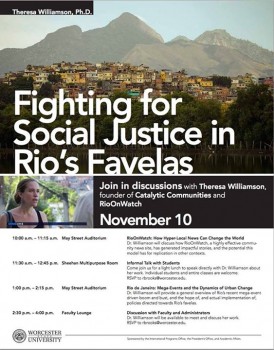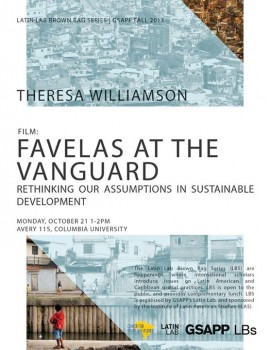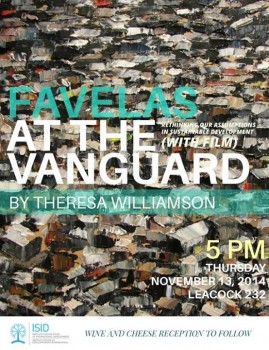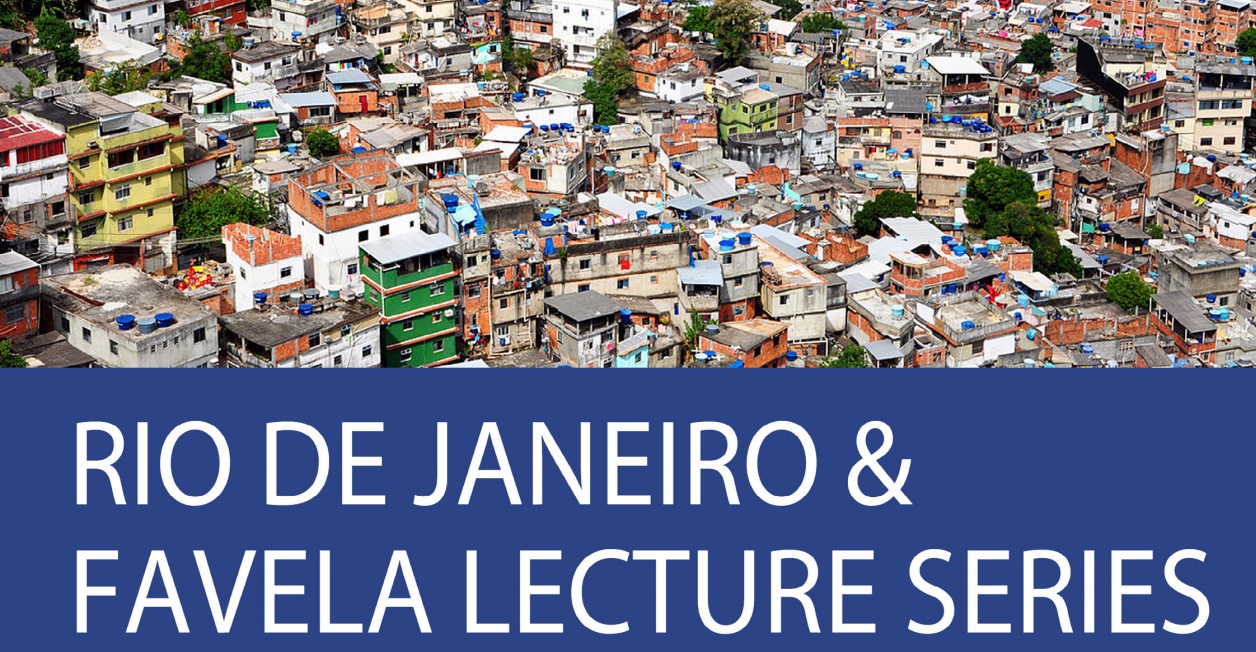Online Lectures for your Students on Rio de Janeiro Favelas by Dr. Theresa Williamson, founder of CatComm
Since 2010, Catalytic Communities’ Executive Director, Theresa Williamson, Ph.D., has given lectures at universities around the world on a range of topics related to favelas and issues of urban development in Rio de Janeiro. This is one of the ways that we disseminate up-to-date information, support research efforts and build awareness of important issues affecting Rio’s favelas. Themes covered cut across disciplines and can help those from disparate disciplines think about the practical implications of their work, such as in urban planning, environmental studies, international development, sociology, anthropology, global health, journalism and beyond. The honoraria, in turn, are a critical source of funding for our four programs: RioOnWatch, the Sustainable Favela Network, Favela Community Land Trusts and the Covid-19 in Favelas Unified Dashboard.
Click Here for Our Thorough Interactive Webpage Describing Talk Subjects
2021 Lecture Series
Dr. Williamson is available to deliver online lectures on the following or related topics, always focused on Rio’s favelas from different perspectives. New lectures can be developed based on request. Past lecture titles are available below. Please share the specs on the lecture of interest to you. Each lecture lasts approximately one hour plus Q&A.
- Rio de Janeiro’s Favelas as Living Heritage: Intangible to Whom? (lecture reflecting on growth of favela museums as an attempt to make tangible the intangible qualities of favelas)
- How Covid-19 Lifts the Mask on Rio’s Favelas: Neglect as Public Policy, Favela Responses and What’s to Come (lecture introducing historic conditions that produced Rio’s favelas—both external neglect and internal organizing—and focusing on how these have unfolded in the context of the pandemic, and what may be expected in future)
- Realizing Favelas As a Sustainable Model via Insurgent Planning: Rethinking Our Assumptions in Sustainable Development (lecture documenting diverse sustainability assets of favelas and tools and approaches to harness this potential moving forward)
- The Potential of Community Land Trusts in Rio’s Favelas (lecture on relationship between favelas and affordable housing policy with focus on CLTs as potential solution for land security in the face of both extremes—eviction and gentrification threats)
- Community Organizing and Keys to Resistance in Pre-Olympic Rio de Janeiro (lecture describing community resistance tactics and strategies to eviction, gentrification and police violence that emerged in Rio in the lead up to the Olympic Games)
- Inspired by Favelas: Catalytic Communities, Case Study of an Adaptive Organization (lecture on the unique, collaborative, flexible and networked model of NGO that is CatComm and the ingredients in our cost-efficient impact model, which is informed by favelas themselves)
- Whose Narrative? What Happens When Rio’s Favelas Speak for Themselves? (lecture discussing the role of ‘privilege’ in who determines the narrative on favelas, including the media and Rio authorities, and how communities are now taking the reins)
- RioOnWatch: How Hyperlocal-to-Global News-making Has Changed the World (lecture describing the unique contribution of the RioOnWatch platform, its inner workings and diverse impacts, by connecting local stories to global audiences in the lead up to the Olympic Games)
- Aberration or ‘Favela Chique?’ Problematizing the Aesthetics of ‘Slums’ (lecture on diverse favela qualities, with the starting point of their aesthetics, and how these qualities are traditionally either marginalized or exploited by outsiders, never to the benefit of residents themselves)
- Telling the Story: Mega-Events and Rapid Urban Change in the ‘Divided City’ of Rio de Janeiro (lecture encompassing timeline of policies and social changes in Rio’s favelas from 2009-2016)
- Rio’s True Olympic Legacy: What Have We Learned? What’s Next? (lecture on unexpected legacy outcomes of the Olympics in Rio, in particular for civil society, and what’s happening now)
Dr. Williamson is also available to deliver the interactive workshop ‘Shatter Your Lens and Sharpen Your View: Rio de Janeiro’s Favelas Will Make You Question Everything You Thought You Knew About Sustainable Cities’ initially delivered at the Ecocity World Summit in Vancouver, 2019.
All lectures and workshops incorporate the very latest in breaking news and community responses. They are highly informed by the experience of favela residents and up-to-date research. Audience members are left with a thorough understanding of the context which is shaping Rio de Janeiro today and the organizations and institutions involved.
In past years, Dr. Williamson has been hosted by a range of departments including: urban planning, anthropology, political science, entrepreneurship, journalism, environmental studies, Latin American studies, criminology, and international relations. Universities have included: American, Augustana (2), Berea, Brown, California Polytechnic, Carroll, Claremont McKenna, Columbia and Studio X, Georgetown, Georgia State, Goucher, Kalamazoo, Marquette, McGill, MIT, NYU, Pacific, Pitzer, Pomona, Pratt, Ramapo, Roger Williams, Rutgers, Smith, Stanford, St. Joseph’s, Swarthmore, Syracuse, UCLA, U. Colorado-Boulder (2), U. Delaware, U. Florida, U. Maryland, U. Pennsylvania (2), U. Richmond, U. Wisconsin-Madison (2 and 3), Vanderbilt, Vassar (2), Villanova, Wellesley, West Chester, Western Michigan, Worcester State, and Yale.
“Theresa Williamson gave a wonderfully comprehensive and insightful talk to our faculty and students about the history of favelas in Rio and the major misconceptions about these neighborhoods. We hope to have her back for another talk and collaborations in the coming year.” — Dr. Marshall C. Eakin, Professor of History, Vanderbilt University
“We had a revealing talk by Theresa and some of the Columbia urban planning students in the group were deeply impressed by her work and vision. I think Theresa is reshaping the role of urban planners in the contemporary city and projecting the profession into the future.” — Jose Luis Vallejo, Professor of Architecture, Planning and Preservation, Columbia University
“It was a terrific talk. That’s my opinion, as both an academic and an activist. And the feedback from everyone else I talked to has been nothing but superlatives. Everyone thought it was informative, the analysis was complex and nuanced, and it gave us great insights into the political and organizing scenes in Rio and Brazil. I’m very pleased and would definitely recommend her talk to others.” — Dr. Thomas Angotti, CUNY/Hunter College, organizer of the New York Planner’s Network event
Logistics
A one-hour virtual lecture plus 30 minute discussion, or multiples talk package are available. Multiple talk packages can include a range of activities such as a variety of classroom talks, ‘Shatter your Lens’ Workshop, individual or group meetings, consultations with faculty researchers, study abroad programs, and/or Portuguese seminars. Presentations are often multi-media. All honoraria are paid to Catalytic Communities, a 501[c][3] nonprofit, to further efforts in support of Rio de Janeiro’s favelas.
Scheduling a Lecture or Workshop
If your department or university is interested in hosting Dr. Williamson please contact u-tour@catcomm.org with your enquiry. You should include:
- The name of the institution and department you are inquiring from
- Possible and ideal dates for the talk, workshop or package of activities
- Whether you would like one lecture, 2-hour workshop or 6-hour package
- The title/s of the lectures you are interested in hosting
- If there will be any requests for tailoring lectures and themes
Brief Content Outlines for Past Talks
1. Aberration or Favela Chique?
Rio de Janeiro’s favelas are among the world’s most widely stigmatized urban neighborhoods, with their overwhelmingly negative image reaching the far corners of the planet. In Rio one frequently hears non-favela residents looking at the communities and describing them as ‘aberrations’ and ‘eyesores.’ Yet across Rio’s tourist markets and the world, the favela aesthetic has seeped into products and experiences of all types, clearly attributing an aesthetic value to these communities. Non-favela residents commercializing this image have been accepted and valued from Bali to Paris, New York to Melbourne. But this value, when produced by residents of favelas, is often mocked or even prohibited. From the vantage point of work conducted over a decade in dozens of Rio de Janeiro’s thousand favela communities, this talk describes and analyzes the heated debate around what might be termed the ‘favela aesthetic,’ and sets out to defend favelas on a number of fronts, including their aesthetic qualities, but also beyond, into the sustainable, economic, and creative practices and urbanistic qualities that have emerged organically from unplanned favela communities, the oldest of which dates back to 1897. Lessons from Rio’s favelas for all our cities are shared.
2. Rio de Janeiro: Mega-Events and Rapid Urban Change in the ‘Divided City’
In the wake of Rio de Janeiro’s recent mega-event driven urban reconfigurations, the transformative years when Rio hosted the 2014 World Cup and 2016 Olympic Games raised hope for actual investments and improvements in the city’s favelas – the city’s most chronically underserved communities. The presentation will provide an introduction to Rio and its social struggles, including the city’s racial history, particularly focusing on the rapid transformation of the city from 2009 through 2016. It offers an overview of Rio’s recent boom and bust’s impact on favelas and a detailed look at how communities have responded, developed and grown resistance strategies in response to these policies. Specifically, the talk discusses the question: what do Rio’s Olympic years teach us about poor urban planning and development policies, as well as effective community organizing and resistance?
3. Rio’s True Olympic Legacy
Dozens of official legacy promises were made to Rio de Janeiro’s citizens that would come as a result of hosting August’s Olympic Games. In the end, what Rio experienced was a very public six year “boom and bust” resulting in deep skepticism and anger over the failed legacies of the Games. Now, two months after the Games, Brazil is living through a deep economic recession, and in Rio crime rates and unemployment are rising while resources dry up, the police are downsizing, and the international media are swooping off to cover the next beat. The Olympics, which invested some $15 billion in the city, feel like a distant memory. And the past week’s mayoral election also brings an entirely new political agenda to the table.
With all these changes taking place as we speak, and taking Rio’s favelas–the city’s most chronically underserved communities–as the focal point, Williamson’s talk presents a deep introduction to Rio and its social struggles, including the city’s racial history, through the lens of Olympic legacy. What do Rio’s Olympic legacy promises tell us about Rio? About the Olympic Games? What were the true impacts of the Games and is there a silver lining? That is, were there impacts the city wouldn’t promote as legacies, that are, in practice, the true legacies? How have communities learned to act and resist thanks to the Games? And in this context, what will happen next to Rio de Janeiro? Is there hope?
The talk, always focusing on the city’s favelas, will provide: an overview of Rio de Janeiro’s history, geography and racial/socio-economic inequality; an understanding of Olympic legacy promises fulfilled and unfulfilled, and unintended but positive outcomes of the Games for community organizers; and a sense of where we are now and the promises and perils ahead for Rio, and their relationship to the Olympic Games.
4. RioOnWatch: How Hyper-Local News Can Change the World
Community media is playing a growing role breaking down the status quo. Centuries-old inequality and racial bias are today being widely questioned thanks to community media during this high visibility pre-Olympic period. Case studies here include our own community news site RioOnWatch, as well as community-run networks like Coletivo Papo Reto, Viva Rocinha, and Imagens do Povo.
In addition to providing a timeline and analysis of the growing role of community media in Rio since 2010, the talk focuses on how RioOnWatch (our hyperlocal-to-global community news site, now a reference for international media outlets covering Brazil as well as international researchers on Brazil and urban topics) came to be, the most impactful stories it has generated, its organizing model (with over 300 collaborators publishing and translating articles voluntarily), the impacts generated on policy through building the media narrative around Rio’s favelas globally, and the potential this model has for replication in other contexts.
5. Whose Narrative? What Happens when Rio de Janeiro’s Favelas Speak for Themselves?
Typically it is the privileged that set a narrative and nowhere is this clearer than in Rio de Janeiro, where the city’s favelas have experienced a 100-plus year legacy of marginalization. The talk will present this historical context in light of recent trends to greater visibility for favela voices and the new narrative that is unfolding thanks to communities’ empowerment, strategic global communications and social media. The talk thus offers effective strategies for confronting privilege, social inequality and power dynamics in transformative ways.
6. Favelas at the Vanguard: Rethinking Our Assumptions on Sustainable Development
Favelas as models of sustainable development. This goes straight to what our organization has become most known for: jarring the logic that unregulated “slums” are a horrid problem and suggesting instead they can actually pose solutions to urbanization worldwide, not only in the obvious ways of providing affordable housing, but actually in the development models they create through that same lack of regulation. Case studies here include Vale Encantado, City of God, Asa Branca, Alemão, Rocinha, and Vidigal.
This presentation offers a deep look at favela qualities/assets from a sustainability orientation, introducing the concept of LEED-UP (applying LEED sustainable design principles to upgrading informal settlements); then quickly contrasting this to what is actually happening in Rio’s favelas today [this can be accompanied by our 26-minute Favela as a Sustainable Model film and an explanation of how the film was made].
7. Community Responses to Eviction, Gentrification, and Police Violence in Pre-Olympic Rio
This talk includes the content from the above mega-events lecture (#1) but focusing more on recent policies directed towards favelas and a detailed look at how communities have responded, developed and grown resistance strategies in response to these policies.
8. Social Entrepreneurship: Scaling by Example / The Case of Catalytic Communities
Presentation not focused on the changes occurring in Rio that Catalytic Communities has been able to impact and document, but on the organization itself. CatComm is a uniquely-styled nonprofit network of collaborators, with a 25:1 volunteer-to-staff ratio, that responds to favela needs in real-time through a flexible and adaptive organizational model and dynamic focusing on one major project at a time and always responding to community needs rather than funder demands. This presentation tracks and explains why the organization developed in such a unique way and its core operating principles today.
Previous University Tours
View the brochures from early tours here: 2011, 2012, 2013, 2014, and 2015.





